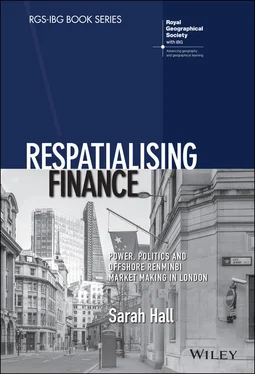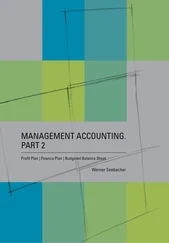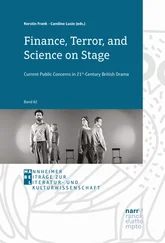Sarah Hall - Respatialising Finance
Здесь есть возможность читать онлайн «Sarah Hall - Respatialising Finance» — ознакомительный отрывок электронной книги совершенно бесплатно, а после прочтения отрывка купить полную версию. В некоторых случаях можно слушать аудио, скачать через торрент в формате fb2 и присутствует краткое содержание. Жанр: unrecognised, на английском языке. Описание произведения, (предисловие) а так же отзывы посетителей доступны на портале библиотеки ЛибКат.
- Название:Respatialising Finance
- Автор:
- Жанр:
- Год:неизвестен
- ISBN:нет данных
- Рейтинг книги:5 / 5. Голосов: 1
-
Избранное:Добавить в избранное
- Отзывы:
-
Ваша оценка:
- 100
- 1
- 2
- 3
- 4
- 5
Respatialising Finance: краткое содержание, описание и аннотация
Предлагаем к чтению аннотацию, описание, краткое содержание или предисловие (зависит от того, что написал сам автор книги «Respatialising Finance»). Если вы не нашли необходимую информацию о книге — напишите в комментариях, мы постараемся отыскать её.
Respatialising Finance
Respatialising Finance
Respatialising Finance — читать онлайн ознакомительный отрывок
Ниже представлен текст книги, разбитый по страницам. Система сохранения места последней прочитанной страницы, позволяет с удобством читать онлайн бесплатно книгу «Respatialising Finance», без необходимости каждый раз заново искать на чём Вы остановились. Поставьте закладку, и сможете в любой момент перейти на страницу, на которой закончили чтение.
Интервал:
Закладка:
In order to conceptualise this, I argue more attention can fruitfully be paid to the territoriality of financial centres. Drawing on the increasing interest in territory in economic geography and beyond (see Christophers 2014; Elden 2005, 2010; Sassen 2008), I demonstrate how the territorial construction of London’s financial district, understood as the (re)production of the space of London’s financial district through state intervention in setting the institutional and regulatory parameters of legitimate financial activity is vitally important in both respatialising our understandings of financial centres but also in understanding and explaining empirically the development of offshore RMB markets in London.
This work understands territory as a way of making and managing space through legal and other regulatory frameworks (Elden 2005, 2010). In terms of work on the geographies of finance, this approach has been developed through the long-standing interest in offshore finance that emphasizes the ways in which offshore space is constructed through the variation of state sovereignty across space (Palan 2006; Roberts 1995). Meanwhile, Pike and Pollard (2010: 38) argue that the vast literature on financialisation needs to remain attentive to the ‘tensions between territorial and relational conceptions of space and place’. Christophers (2014: 755) has taken this analysis a stage further by examining how:
“Modern capitalism is constantly in the process of enacting territorial fixes: constituting, segmenting, differentiating and extracting value from actively territorialized markets at a range of geographical scales”
This provides a valuable extension of Harvey’s (1982) understanding of spatial fixes by demonstrating how capitalism seeks to overcome its crisis-prone tendencies not only through spatial expansion but also through the remaking of space through regulatory and other political interventions.
By integrating work in IPE on monetary transformation with cultural economy literatures on market making and the growing interest in territory as found in the state rescaling literature, the central conceptual contribution made in Respatialising Finance is its insistence that financial centres need to be seen as territorial fixes. The remaking of their regulatory, political, economic and epistemic space aims to (re)produce their institutional arrangements of rules, informal customs and practices both within the financial centre but also by uploading these norms into the international financial system more generally. In so doing, I argue that they are places where aspirations are set out in both the private and public sector. They are also spaces where power games are played out and different visions of what global finance is or could be are then uploaded into the international arena. This approach then provides greater specificity to claims frequently made that IFCs are ‘obligatory passage points’. In this respect I argue that they are obligatory passage points in the ways in which flows come through them but take this a stage further by thinking about how the flows that are frequently studied become reengineered and then uploaded into global finance. In short, by understanding financial centres as a territorial fix, I’m interested in the ways in which they are both shaped by but also shape the production of global finance in particular ways.
This approach gives rise to the title of the book because it points to three ways in which our understandings of IFCs and the international financial system of which they are a part can, and indeed should, be respatialised in three important ways.First, Respatialising Finance draws attention to the range of different scales in which politics is operationalised within the financial system. For sure, state actors are crucial here, but the analysis also reminds us to attend to the ways in which policymakers at the city level are important, but hitherto often overlooked, agents in shaping the nature of financial centres and in turn the shape of the international financial system. This is the first sense in which respatialising is at work in this book – thinking more explicitly about the politics and power at work within particular places, namely financial centres in the international financial system.
In so doing, I use work on state capitalism and particularly Alami and Dixon’s (2020) call to think more carefully about where state capitalism is located. I argue that this is a valuable response to criticisms of world city approaches to IFCs that Brenner (1998) suggests have tended to endorse a ‘zero-sum’ approach to spatial scale that inaccurately posits the retreat of state authority as a necessary precondition for the increased significance of global processes. In so doing, my approach retains the focus on the city that world city approaches provide but I seek to move beyond a ‘global/local dualism’ that has, ‘deflected attention away from the crucial role of the state scale in the currently enfolding transformation of world capitalism’ Brenner (1998:2).
Second, Respatialising Finance does not see IFCs only as receptors of the flows of people, capital, ideas and regulations that make up global finance. Rather, IFCs are understood as places in which the norms of global finance are practised, debated and altered in ways that shape global finance. This approach goes beyond understandings of IFCs as ‘obligatory passage points’ (Van Meeteren and Bassens 2016) that are desirable locations for firms because of the market access and liquidity, concentration of business skills, and infrastructure that they will benefit from by being located there. This is undoubtedly true and is reproduced through a now significant consultancy industry that seeks to assess the relative benefits for firms of being located in particular cities (see, for example, the annual rankings of financial centres produced by the consultants Z/Yen). However, in this reading, cities, and in the case of Respatialising Finance , financial districts within them in particular, are rather inert. They are sources of attraction for firms but the implications of this for the wider networks of which the cities are a part has been relatively overlooked. Respatialising Finance is concerned with how practices, regulations and conventions developed in IFCs are ‘uploaded’ to the international financial system – thereby shaping global finance in important ways.
Third, this book seeks to respatialise our understandings of global finance by thinking carefully about the geography of work on financial centre networks. This has been clearly identified by work that criticises the global cities approach for predominately focusing its attention on cities in the Global North (Robinson 2002). This geography is certainly reflected work on financial centres with the greatest attention paid to the so-called NY–LON connection between London and New York (Beaverstock 2005; Sassen 2001). Indeed, calls have been made for economic geography, including work on financial geography to decentre its focus beyond these key sites in Anglo-American capitalism (Pollard and Samers 2007). Recently, this has begun to be addressed through research that examines the operation of global cities and international financial centres beyond Europe and North America. For example, Lai has examined the relations of competition and cooperation between financial centres in Asia (Lai 2012) and others have explored developments in Asia (Kleibert and Kippers 2016).
The Structure of the Book
I develop this argument in seven further chapters that are divided into two parts. In Part I, Chapters 2and 3set out the theoretical basis and contribution of the book. In Chapter 2, I position RMB internationalisation within wider political economy approaches to international finance with a particular focus on the different ways in which the state plays an important role in shaping global finance. In Chapter 3, I explore how the financial district might be productively added to this literature in order to develop a meso-scale understanding of the financial centre as a territorial fix that is both shaped by and shapes global finance. In Part II of the book I operationalise and develop this conceptual approach through the case of RMB market making in London. In Chapter 4, I set out London’s role in RMB internationalization in more detail before describing my methodological strategies. Chapters 5, 6and 7each offer a different spatial cut through the ways in which London’s IFC serves as a territorial fix within RMB internationalisation.
Читать дальшеИнтервал:
Закладка:
Похожие книги на «Respatialising Finance»
Представляем Вашему вниманию похожие книги на «Respatialising Finance» списком для выбора. Мы отобрали схожую по названию и смыслу литературу в надежде предоставить читателям больше вариантов отыскать новые, интересные, ещё непрочитанные произведения.
Обсуждение, отзывы о книге «Respatialising Finance» и просто собственные мнения читателей. Оставьте ваши комментарии, напишите, что Вы думаете о произведении, его смысле или главных героях. Укажите что конкретно понравилось, а что нет, и почему Вы так считаете.












